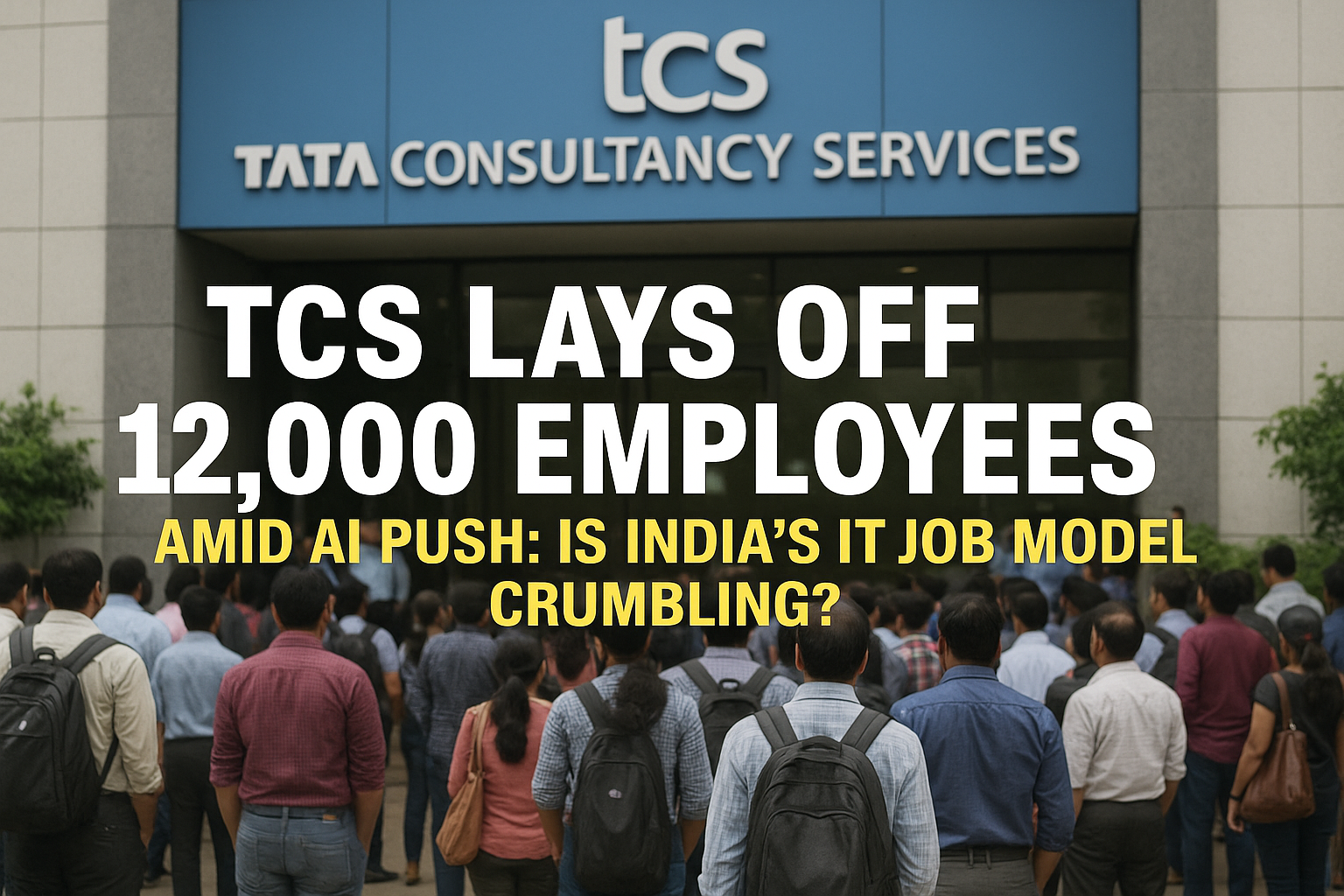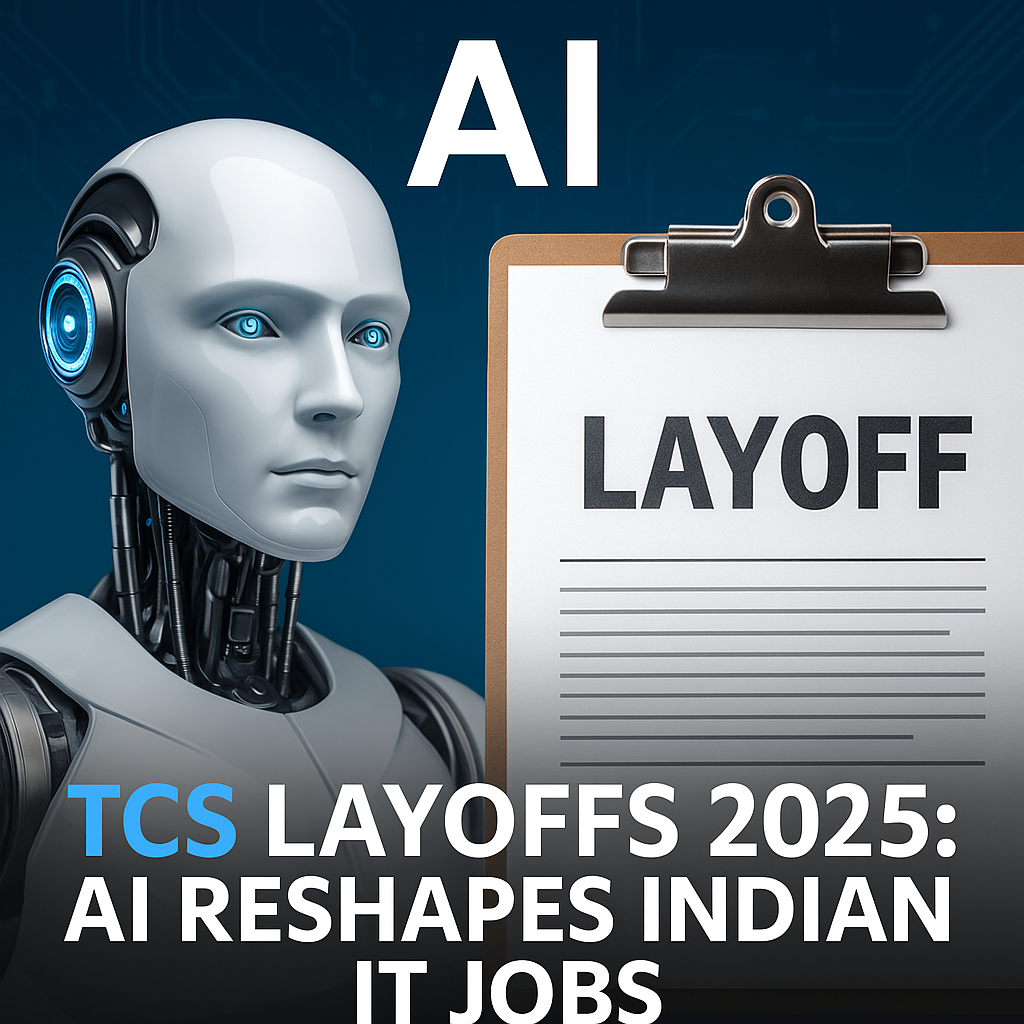TCS Layoffs 2025: AI Reshapes Indian IT Jobs

Tata Consultancy Services (TCS), Layoffs 2025 have shaken the Indian IT sector, raising critical questions about the role of AI in replacing human jobs. The layoff of approximately 12,000 employees—a move that has sent shockwaves through the tech industry. While the company attributes the layoffs to “skill mismatches,” the timing coincides with an aggressive shift toward AI-driven efficiency and automation, raising a larger question:Is India’s traditional, manpower-heavy IT job model becoming obsolete?
What Happened?
According to official statements, TCS is in the process of releasing nearly 2% of its workforce over the next financial year, citing performance issues and lack of skills as key reasons. While the company insists this is part of a regular talent optimization strategy, the scale and framing suggest a deeper transformation underway.
Interestingly, the announcement comes at a time when AI tools like ChatGPT, GitHub Copilot, and automation platforms are being rapidly adopted across the global IT sector. These tools are capable of doing in minutes what used to take hours — especially in coding, QA testing, and customer support — roles traditionally held by thousands in India.
What TCS Said – and Didn’t Say
TCS CEO K. Krithivasan clarified in a recent interview that AI was not directly responsible for the layoffs. He stated the real issue was a mismatch between available skills and evolving project demands, particularly at mid-level and senior roles.
“We have to gradually let go of people whose skill sets are no longer aligned with client needs,” Krithivasan said. (Source: Livemint)
However, analysts and former executives suggest otherwise.
“The Sholay Era is Over”
C.P. Gurnani, former CEO of Tech Mahindra, described the layoffs as the end of the ‘Sholay Era’ — a term he used to describe the old model of hiring armies of engineers to run backend tasks for global clients. “Kitne aadmi the? That model is now dead,” he said, referring to the iconic Bollywood line. “AI is not the future — it is the present.”
(Source: Economic Times)
Industry Signals: It’s Not Just TCS
Other Indian IT giants are reportedly slowing hiring and increasing automation budgets. From HR bots to AI-powered project management tools, the low-cost labor advantage India once held is slowly being replaced with smart machines and minimal teams.
A Harvard Business Review study estimates over 30% of IT job tasks in India are now automatable.
Employee Reactions: Protests and Fear
The emotional toll is clear. A video recently went viral showing a TCS employee sleeping outside the company’s Pune office, claiming non-payment and sudden dismissal.
The Ministry of Electronics and IT has taken note and is reportedly monitoring the situation.
Is This the Future?
Yes — and no. While AI is not the sole reason for the layoffs, it is accelerating the need to re-skill, automate, and evolve. TCS’s move reflects a global trend where companies prefer smaller, highly specialized teams who can collaborate with AI tools, rather than thousands of low-cost developers doing manual work.
What Can Indian IT Professionals Do?
- Upskill in AI, data science, cybersecurity, and cloud platforms
- Avoid stagnating in legacy skills like manual testing or basic support
- Explore non-IT sectors also embracing AI: finance, healthcare, law
- Stay informed and adaptable — because change is no longer coming, it’s here
Final Thoughts: A Wake-Up Call

TCS’s 12,000 layoffs are not just numbers — they are a symbolic moment. A wake-up call not only for IT professionals, but for policymakers, colleges, and companies relying on outdated workforce models.
India must now decide:
Will we mourn the death of the “Sholay Era”? Or embrace the birth of an AI-augmented digital future?
🔎 FAQs: TCS Layoffs & AI Impact on Indian IT Jobs
1. Why did TCS lay off 12,000 employees?
TCS cited a “skill mismatch” as the primary reason. The company claims the layoffs are part of performance-based restructuring and not directly due to AI.
2. Is artificial intelligence responsible for the layoffs at TCS?
While TCS denies AI as the direct cause, the timing and industry trend suggest that AI adoption is reducing the need for traditional IT manpower.
3. Who is most affected by the TCS layoffs?
The layoffs reportedly target mid-to-senior level employees, particularly those whose skills no longer align with client needs or new technology demands.
4. How is the government reacting to the TCS layoffs?
The Ministry of Electronics and IT is monitoring the situation, especially after protests and reports of unpaid salaries surfaced.
5. What skills are in demand now in the Indian IT industry?
Key in-demand skills include:
- Artificial Intelligence & Machine Learning
- Data Science
- Cybersecurity
- Cloud computing
- DevOps
- Low-code/No-code platforms
6. Will other IT companies in India follow TCS?
Yes, many firms like Infosys, Wipro, and Tech Mahindra are also moving toward automation, and may restructure their workforce in the coming quarters.
7. What does C.P. Gurnani mean by ‘Sholay Era is over’?
He refers to the end of India’s labor-heavy IT model, comparing it to the old style of deploying thousands of engineers for repetitive tasks now handled by AI.
8. What should freshers do to stay relevant in the AI era?
Freshers must focus on building real-world problem-solving skills, learning AI tools, and staying updated with industry trends through certifications and projects.
9. Is there still a future for Indian IT engineers?
Yes — but it demands continuous upskilling. The future belongs to those who can work alongside AI, not be replaced by it.
10. How can professionals prepare for upcoming tech disruptions?
- Enroll in courses related to emerging technologies
- Build a personal project portfolio
- Learn to work with AI tools (e.g., GitHub Copilot, TensorFlow, ChatGPT APIs)
- Focus on soft skills like communication, leadership, and adaptability
📍 Source references:
- Direct quotes from K. Krithivasan & C.P. Gurnani
- Economic Times, Livemint, Times of India, Harvard Business Review
